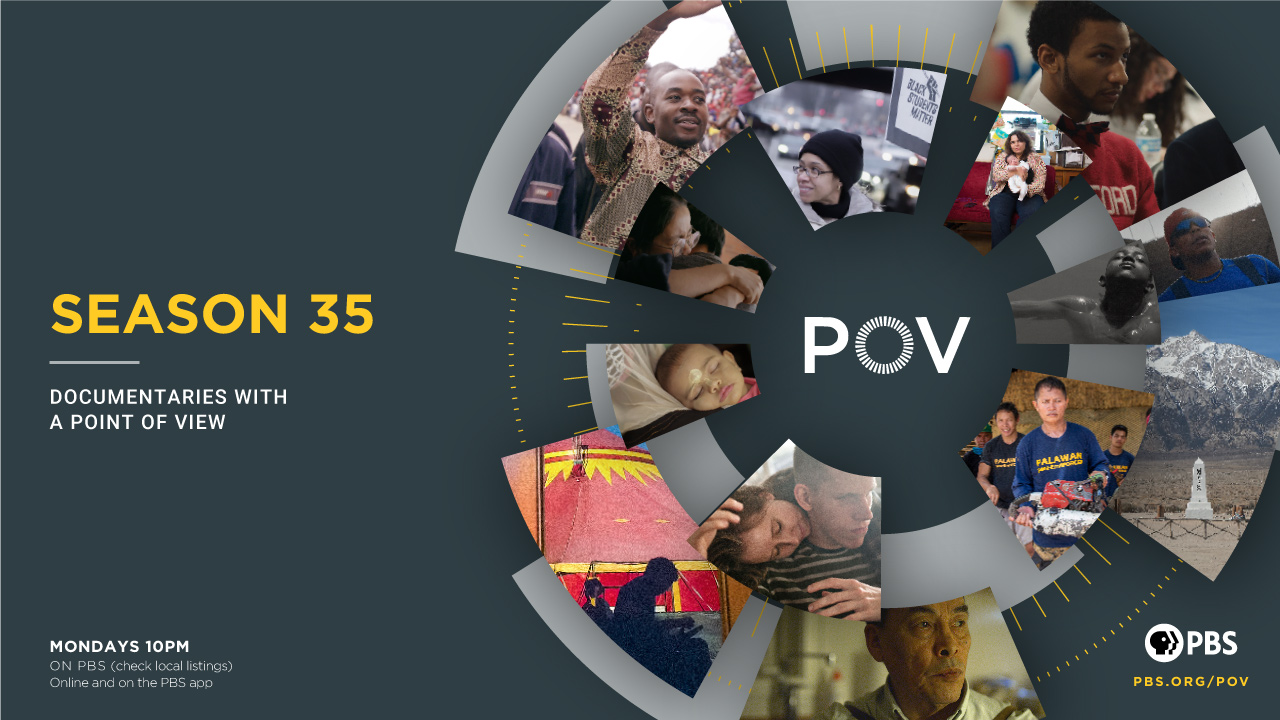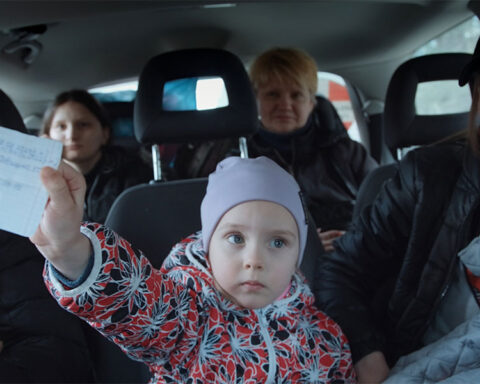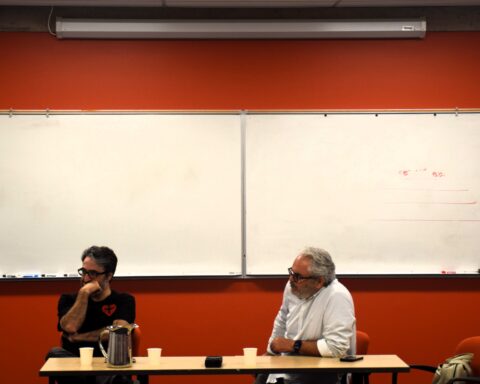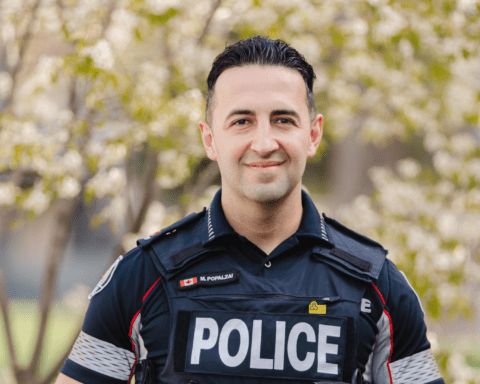Wuhan Wuhan, the documentary which will open the 35th season of the award-winning, non-fiction PBS series, POV on July 11, was instigated by an incident of anti-Asian racism that mirrored filmmaker Yung Chang’s childhood experiences of othering as a Chinese-Canadian growing up in the small town of Oshawa, Ontario.
In March 2020, Chang was on a walk in his West End Toronto neighbourhood, pushing his three-year old daughter in her stroller, when he noticed a white male in his early thirties on the other side of the street giving them intimidating stares. When Chang held his gaze, the man asked if he had a staring problem. “Who’s staring at who?” Chang replied, and walked away. The man called after him, “Yeah, keep f___ing walking. You and your ugly baby!”
“It was something I hadn’t really felt since I was a kid growing up in a small town,” Chang says. “That sense of feeling that you don’t belong, which is quite upsetting, especially when it was directed also to my daughter.”
While sitting with the aftermath of the unsettling incident, Chang received a call from Starlight Media, a Los-Angeles based production company, which had acquired over 300 hours of footage from the early days of the pandemic in Wuhan. He was touched by the stories he viewed, including that of a young woman nine months pregnant and her husband, a laid-off factory worker voluntarily driving medical supplies from the quarantine hotels to the hospitals. It was “eye-opening” for Yung and he decided to create a film to highlight this on-the-ground reality.
While working on the production of Wuhan Wuhan, incidences of anti-Asian racism continued to rise, including the shooting of six women of Asian descent in spas in Atlanta, Georgia in March 2021. Chang says his team was deeply affected by this incident and it further fueled their efforts to create a film “geared towards humanizing a city and the people.”
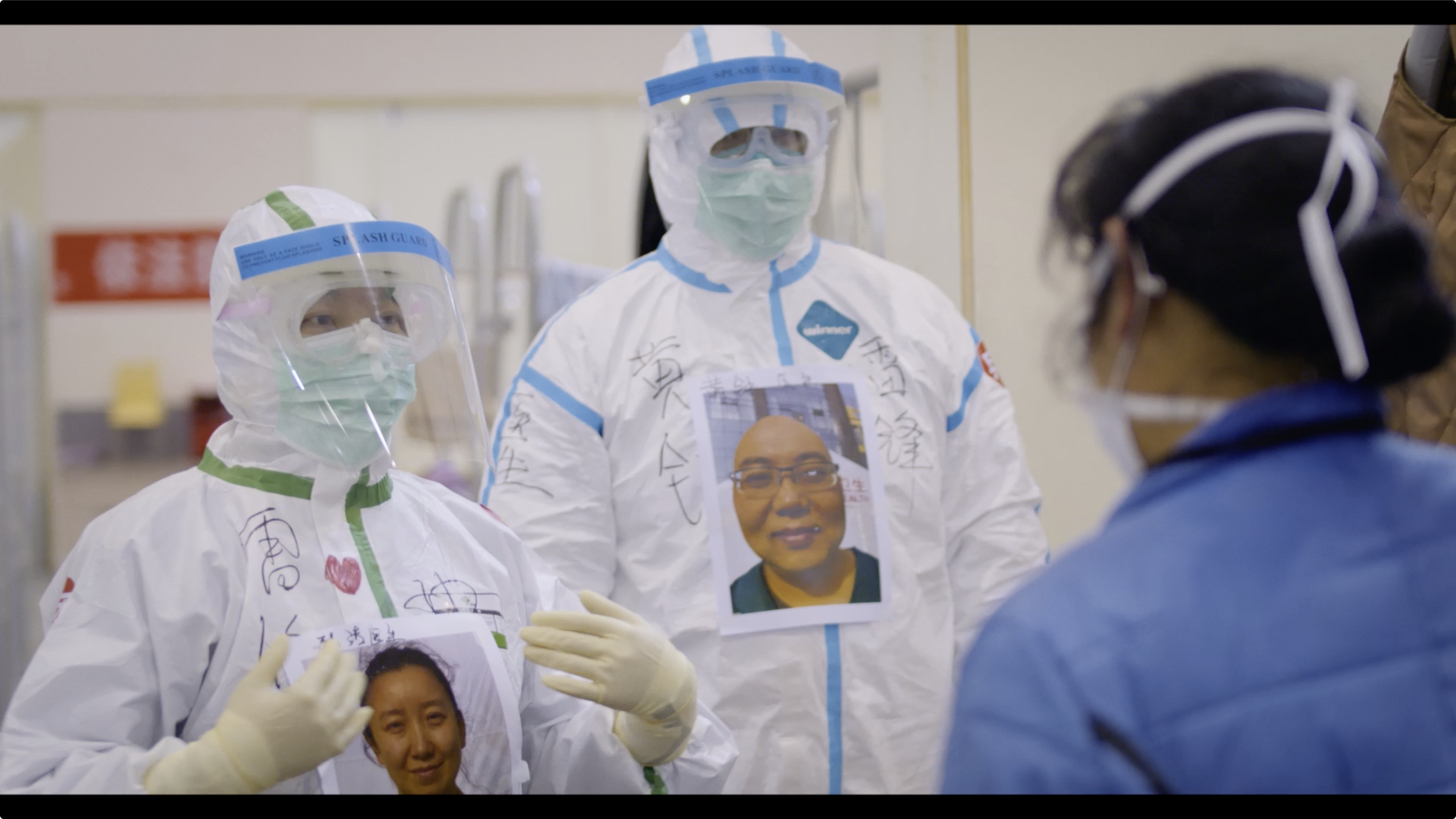
He shares the quote written by a seventh-century Japanese official in a letter to a Chinese official that they used to inspire them during the process: “We’re separated by mountains and oceans, yet between us, we share the same sky and the same feelings.”
“I don’t think I’m ever going to convert the racist, but at least I’m hoping that I can add something like what great cinema does … striving for that humanism,” says Chang. “And I think documentary has that power… to immerse the viewer into a world that is not contrived.”
A tool to evoke empathy
Through evoking emotions in the audience rather than simply conveying information, Chang says documentary can be used as a tool to create empathy.
Award-winning Filipino Canadian documentary filmmaker, Joella Cabalu felt both helpless and wary walking around in her Vancouver neighbourhood in the context of rising anti-Asian racism and wondered, “What can I do as an artist, as a filmmaker in this moment?” She remembered the footage she had captured from the Koto restaurant just before it closed in June 2019 and was propelled to finish the film.
Directed by Cabalu and co-produced with Kenji Maeda, Koto: The Last Service showcases the story of the Maeda family’s Japanese restaurant which ran for 39 years in Campbell River, B.C.
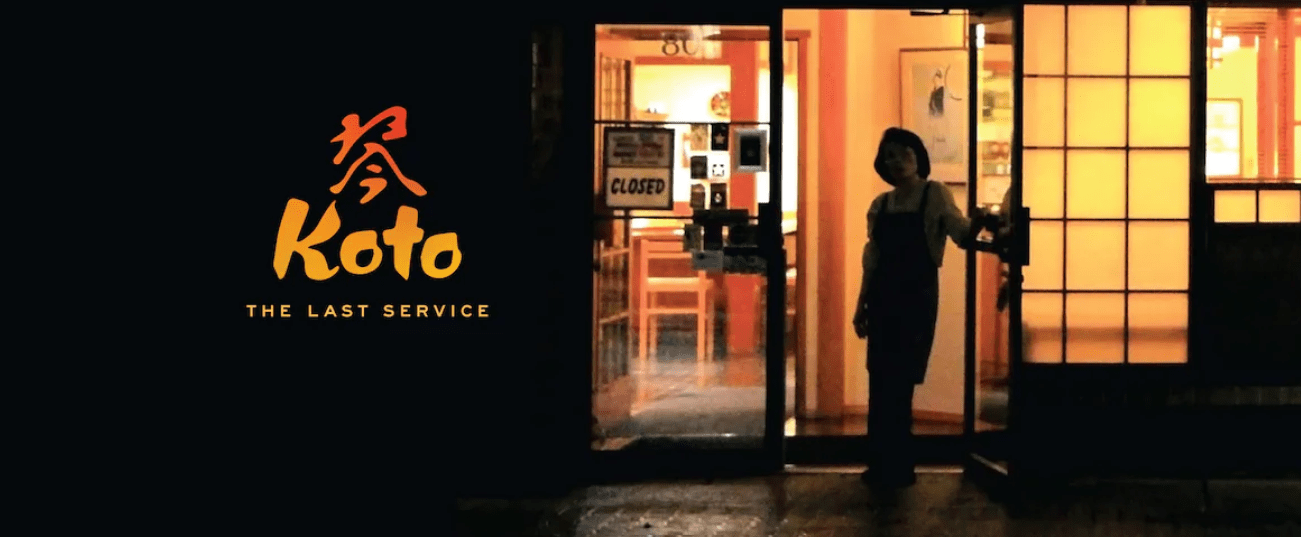
For Maeda, the film was a way to “archive” the family legacy, including his father who was integral to the restaurant’s success and passed away a few years earlier.
Witnessing how the community had welcomed the Maeda family while making the film forced Cabalu to confront her own biases, as it conflicted with her assumptions that the family would face racism like what she had experienced, particularly in a small town.
“How I saw it now was as a kind of a self-soothing balm for all of the racism and violence that was happening,” Cabalu says. “That there are positive portrayals of not only Asian Canadians but also small towns and their relationships with immigrants and immigrant families.”
Highlighting community relationships
When the restaurant first opened, Maeda says his father tried to localize it by using sockeye salmon and “snuck in” the raw fish, only revealing what it was after people had tried and enjoyed it.
The restaurant went on to become a community hub for five generations of families, says Maeda, many trying sushi there for the first time.
Cabalu was moved by the customers they interviewed.
“The woman from New Zealand who comes in with a bouquet of flowers … just that embrace and how much she especially was going to miss the restaurant but also just having the family as a constant in her life,” says Cabalu. “It was the first tiny moment for me to think that there’s more to this restaurant than just what they serve there. It’s really about relationships.”
When the family announced the restaurant was closing, there was an outpouring of community support, says Maeda, including over 200 comments on Facebook. For him, the film was a way to showcase the long-time support of the community for the family sharing both their culture and food.
Modelling healthy interracial communication
Cabalu is now developing her next project, Nakabingwit: First Comes Love, which she says will “follow three Filipino Canadians and their white partners navigating race and romance against the backdrop of Canadian multiculturalism.”
As an immigrant who arrived in Canada in the early 90s at age six, Cabalu was taught that multiculturalism welcomes everyone. She says she has since learned it is “an incentive to attract migrant labour to this country and to really uphold white supremacy in the guise that as long as you align yourself to whiteness, you will thrive, which is really a myth.”
In her view, this has been integrated into our romantic relationships, with the idea that “love doesn’t see any see colour,” leaving a lack of tools on how to navigate the challenges of interracial relationships.
The idea for the film was born ten years ago, when she began dating her first white partner, who she has been with since. At the time, Cabalu says a friend reacted as though she had “won the lottery,” leaving her with a sense of disgust but also pride in this “accomplishment” as an immigrant who had had many unrequited crushes on white boys growing up. Disturbed, she wondered if other Filipino Canadians were experiencing something similar.
For Cabalu, these questions were heightened with the “racial reckoning” in 2020 after the death of George Floyd.
“I started to notice in my circles that other Filipino Canadians were confronted with this question of how do I navigate this question of race and being in solidarity with Black and Indigenous people? And, you know, have this conversation with my white partner,” says Cabalu. “And I found that it very much reflected some of the challenges that I was having as well.”
In the film, Cabalu hopes to look at couples in different stages of their relationship, as well as the impact of labour and class. How does a Filipina activist who facilitates conversations on anti-racism, for example, navigate her personal life with her British partner? she asks.
In Cabalu’s view, documentaries can serve as a model for how to navigate these difficult conversations in a healthy way. She aims to pay homage to the romantic comedies of the nineties while simultaneously subverting the genre by demonstrating the complexities of interracial relationships and “a radical way of being in solidarity with our partner.”
“Right now, we are very quick to vilify and … there’s certainly some instances where that is appropriate response,” she says. “But with relationships that we value, that we want to grow with, I think we also have to make space for those really gross, uncomfortable conversations we all would rather prefer not to have but it’s inevitable. And I think we grow by practicing.”
Daniela Cohen is a freelance journalist and writer of South African origin currently based in Vancouver, B.C. Her work has been published in the Canadian Immigrant, The/La Source Newspaper, the African blog, ZEKE magazine, eJewish Philanthropy, and Living Hyphen. Daniela's particular areas of interest are migration, justice, equity, diversity and inclusion. She is also the co-founder of Identity Pages, a youth writing mentorship program.

